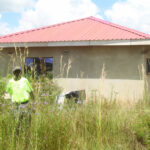Zimbabweans are bracing for even more severe power cuts as the Kariba Dam, a vital source of electricity for the country, is set to be shut down until the rains come.
The dam, shared with Zambia, has been experiencing critically low water levels due to a severe drought exacerbated by climate change.
The Zambezi River Authority (ZRA), the bi-national body responsible for managing the water resources of the shared lake, reported that as of August 26, 2024, the lake’s live storage, or the water available for power generation, had dropped to a mere 8.71 per cent. This is a stark decline from the design operating capacity of 13 metres, leaving only 1.26 metres of usable water.
The situation has forced Zambia to announce the shutdown of its Kariba North Bank Power Station on September 14, 2024. This follows a similar shutdown in November 2022, when the Zimbabwean side of the dam was forced to stop power generation due to low water levels.
The Zimbabwe Power Company (ZPC) is also expected to shut down its Kariba South Bank Power Station within the next few weeks. This will leave Zimbabwe relying heavily on its ageing thermal power stations, which are already struggling to meet the country’s energy demands.
The current drought is the second time in recent years that the dam has been forced to shut down due to low water levels. The record lowest live storage of 475.60 metres, or about 0.8 per cent usable storage, was recorded on December 30, 2022.
The situation is particularly dire for Zimbabwe, which already faces power cuts of up to 12 to 14 hours daily. Zimbabwe’s Energy Minister Edgar Moyo told parliament that the country is currently only able to produce an average of 214 megawatts from Kariba, a significant drop from the dam’s installed capacity of 1,050 megawatts.
“After losing over 800 megawatts, it makes it very difficult to sufficiently supply power in the country,” Moyo said.
Zimbabwe has 2,771MW installed capacity, and 1,795MW operating capacity, with a peak demand of 1,693MW. The Zimbabwe Power Company (ZPC) operates a generation fleet comprising four thermal power stations that collectively supply electricity from four thermal and one hydro power stations.
The severity of the situation is reflected in the rising power cuts in Zambia, which are now reaching 20 hours daily. This is due to the country’s heavy reliance on hydropower, with 83 per cent of its electricity coming from hydro sources.
ZESCO spokesperson Matongo Maumbi warned that the country can expect significant power cuts into the future, with the power deficit projected to increase to 1,280 MW in September.
While Zimbabwe has a higher installed capacity of 2,771 MW, its operating capacity is only 1,795 MW, with a peak demand of 1,693 MW. The country is currently relying heavily on its Hwange thermal power station, which is struggling to keep up with the demand and most of the time, one or two of its 6 units are usually down for maintenance of due to faults.
To address the ongoing energy crisis, Zimbabwe is exploring alternative energy sources, including solar power. The country has signed deals for more than 2,000 MW of electricity from solar projects.
In the short term, ZESA Holdings, the country’s power utility, has unveiled a plan to install a utility-scale battery energy storage system capable of providing three hours of 600 megawatts during peak periods. This will help to reduce load shedding, particularly during peak hours.
“The system will provide three hours of 600 Mhw during morning and evening peaks. This will substantially reduce load-shedding, besides providing some benefits to system operations,” explained ZESA Holdings executive chairman Dr Sydney Gata.
The project is currently in the procurement phase, with the energy to charge the batteries being sourced off-peak. ZESA is also importing electricity to supplement local generation, particularly as water levels at Kariba Dam remain low.












